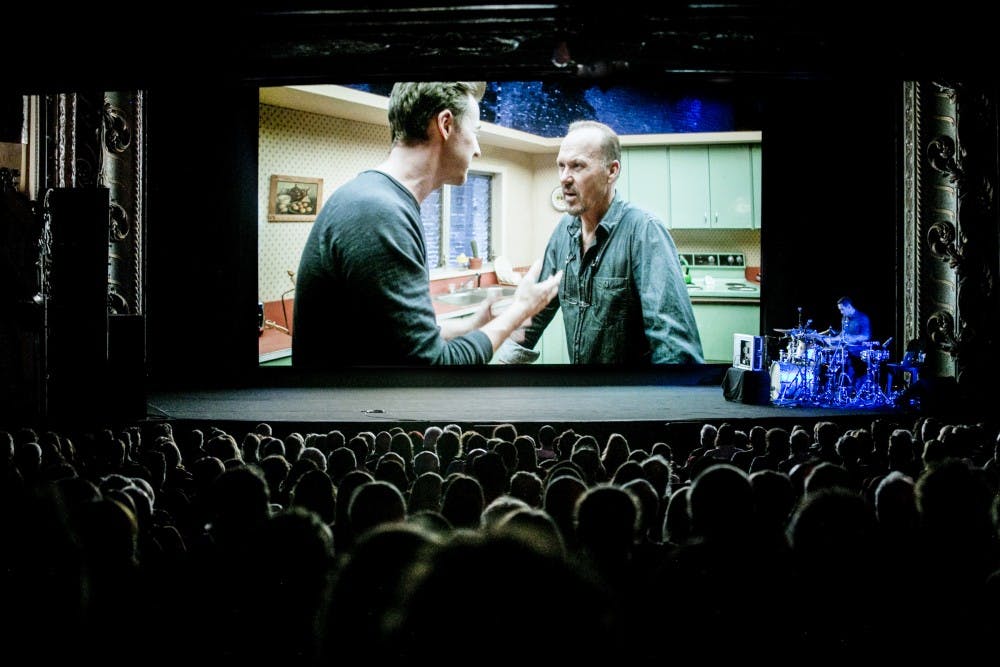The Oscar-winning movie “Birdman” boasts leading roles played by some of the biggest names in Hollywood—yet the first voice an audience hears at the start of the film is not that of Michael Keaton or Emma Stone or Zach Galifianakis. Rather, it’s the voice of Antonio Sánchez, whose face never appears but whose hidden touch guides every scene.
“I was like, ‘Oh my god, that’s my voice,’” Sánchez, who composed and recorded the score for “Birdman”—which consists almost exclusively of drums—said of seeing the movie for the first time. “It just blew me away completely.”
This ethereal, invisible voice will make an appearance at Duke’s Reynolds Industries Theater October 29 at 8 p.m., where Sánchez will bring the score to life alongside a screening of “Birdman.” The show will highlight the drums’ narrative role in the film—but they won’t be the same drums audiences may have heard in the movie theater.
Jazzheads and drummers know Antonio Sánchez as a world-class act whose career spans nearly two decades and has birthed multiple records both solo and with the Pat Metheny Group. In fact, Sánchez was so busy touring Asia—where he had no access to the movie—that he didn’t even see “Birdman” in its finished form until long after its initial opening fall 2014.
It was then, sitting with his wife in a local cinema for a deserted two o’clock matinee, that Sánchez heard his voice in the film for the first time chatting in Spanish with director Alejandro G. Iñárritu in the studio. As the drums spurred the opening credits to life, the drummer’s popularity moved beyond a jazz audience and into the world at large.
Despite a technicality that prevented an Oscar nomination for the score, Sánchez’s propulsive drumming for “Birdman” is, for many fans, as integral to the film as is the black-comedy plot or the single-shot cinematography.
Some, like Aaron Greenwald, executive director of Duke Performances, argue the drums constitute “another character.” Greenwald pointed out that the drums occupy over an hour as a presence in the film—matching or exceeding the screen time of many primary characters.
The drums act as a living, breathing force within the scenes of the movie; they provide, in the drummer’s own words, a “carpet” for both the trivial (say, an opening door) and the existential (the audience’s grip on reality). To Sánchez, the primal nature of drums allows them to bring out the “frenetic feel and energy” of the script. This quality is a marked departure from traditional Hollywood scores, which dictate every emotional turn with not-so-subtle flourishes of strings and brass.
“It doesn’t spoon-feed you what you’re supposed to feel,” Sánchez said of the drum score. “A lot of scores nowadays, if it’s a sad scene, we have to have strings and minor chords. [The drum score] doesn’t guide you literally like that. It leaves a bit more room for interpretation. It’s a bit more ethereal.”
In keeping with the improvised essence of the original takes, Sánchez takes his knowledge of each scene’s general dramatic effect and improvises the accompanying music accordingly for live performances of the score. Every performance, then, is “completely unique,” the energy of the film captured in one fleeting reincarnation.
“That’s what jazz is,” Sánchez said. “It’s being in the moment and not forgetting that what you are that day is different than what you were before and what you’re gonna be the next day.”
Already one of the more buzzed-about events on the lineup of Duke Performances’ 2016-2017 season, the "'Birdman': Film + Live Score" represents the intersection of the accessible and the avant-garde that has driven the Duke Performances series since Aaron Greenwald helmed the program nearly ten years ago, coinciding with what Greenwald has perceived as an upward shift in the general attitude toward arts on Duke’s campus. Just as the movie brought jazz drumming to a wider audience, Duke Performances has brought challenging art to audiences that may otherwise have been oblivious to it. Greenwald noted that “Birdman,” while tremendously successful on a mainstream platform, may represent to college students something more personal and meaningful than, for instance, the latest “X-Men” movie.
For Antonio Sánchez, “Birdman” represented a turning point in an already distinguished career. Even without a nomination to his name, Sánchez escaped Oscars night with, to his estimation, “like, fifteen hundred” new followers on his Facebook page. This exposure spread well beyond social media—he found that fans of the movie, curious about his work, began turning out to his gigs.
But the drummer stressed that, despite being touched by that “gold dust,” the score differs little from his work as a solo and group artist in its spirit of individuality and improvisation—explaining, in part, why each live score is a unique experience.
“I’m just reacting to my surroundings,” Sánchez said. “Usually I react to other musicians and the music—this time I was reacting to a plotline and a film.”
Merely reacting was enough to elevate Sánchez to a coveted plane of influence as a jazz musician. And in a movie where he gets the first word, Antonio Sánchez also gets the last—only this time, as the infamous final scene cuts abruptly to the closing credits, he lets the drums speak for him.
Get The Chronicle straight to your inbox
Signup for our weekly newsletter. Cancel at any time.

